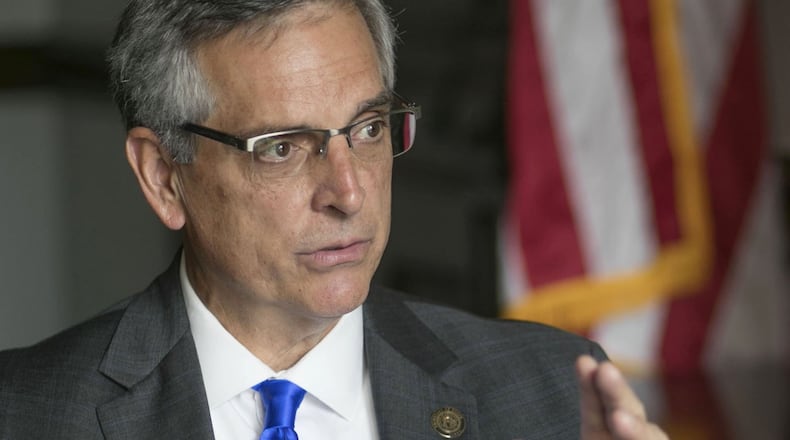State representatives demanded improvements in Georgia’s elections Tuesday as they confronted Secretary of State Brad Raffensperger with questions about what went wrong.
Raffensperger acknowledged that long lines in Georgia's June 9 primary were "unacceptable" but downplayed problems with the state's new voting system. He said most difficulties in the election occurred in Fulton County, which had some of the most extreme wait times.
The state Capitol hearing, part of an investigation ordered by Republican House Speaker David Ralston, came as legislators are seeking ways to avoid a repeat of three-hour waits, precinct closures and equipment difficulties during a high-turnout presidential election in November.
"It's not going to work and it's not going to be good enough for you to just keep saying it's in Fulton County and not my issue," said state Rep. Renitta Shannon, a Democrat from Decatur. "What specific policies are you going to put in place?"
Raffensperger, a Republican, responded that election officials need to add voting locations, improve hands-on training and encourage early voting. He said he's reaching out to community groups such as Rotary Clubs, Boy Scouts and sororities to ask whether they can host precincts.
“You need larger polling locations or you need more polling locations,” Raffensperger said. “The most important thing obviously is training, training and retraining, and having more technicians in there.”
While voting problems were concentrated in Fulton County, voters reported delayed openings and long lines across other parts of the state, particularly in highly populated areas with many registered voters. Twenty counties held precincts open late on election night.
Raffensperger said he plans to put a tech support expert in every voting location in November after poll workers struggled to set up voter check-in tablets, touchscreens and printers for the primary. Georgia’s $104 million voting system prints out paper ballots for the first time after 18 years of the state’s reliance on electronic voting.
Just 14 pieces of voting equipment had to replaced for mechanical issues on election day, Raffensperger said. But that figure doesn’t account for the troubles poll workers faced logging into check-in tablets, encoding voter access cards and hooking up equipment correctly. It also omits voting machines taken out of service by poll workers who couldn’t get through for help on busy phone lines.
Lawmakers are considering a bill pushed by Raffensperger that would force some changes in elections in time for November.
The House Governmental Affairs Committee, which conducted the election inquiry, plans to consider a bill Wednesday that would require election officials to add precincts, poll workers or voting equipment if voters had to wait in line for more than an hour in the previous election. Democrats and voting rights groups oppose provisions of the legislation, Senate Bill 463, that they say shift responsibility from state election officials and introduce photo ID to absentee voting.
State Rep. Darlene Taylor, a Republican from Thomasville, said county election officials need to take responsibility for accommodating their voters.
“I feel like we’re pointing fingers everywhere,” Taylor said. “These are things that need to be done at the county level. This goes back on our local folks to get it done.”
Besides precinct losses and equipment difficulties, the largest strain on the primary election came from the coronavirus pandemic, which limited the number of people who could vote at a time. At the Park Tavern precinct in Piedmont Park, just eight people were allowed to vote at once in a voting location that had to accommodate over 16,000 registered voters. Some voters waited more than three hours.
“This really was an election unlike any other,” State Elections Director Chris Harvey said. “Yes, there were some problems. We’re working specifically on those problems with the folks that are responsible.”
But election officials acknowledged Tuesday that they’ll face similar difficulties again if the coronavirus doesn’t subside before the presidential election, when 5 million voters are expected — more than double the 2.2 million turnout in the primary.
About the Author



